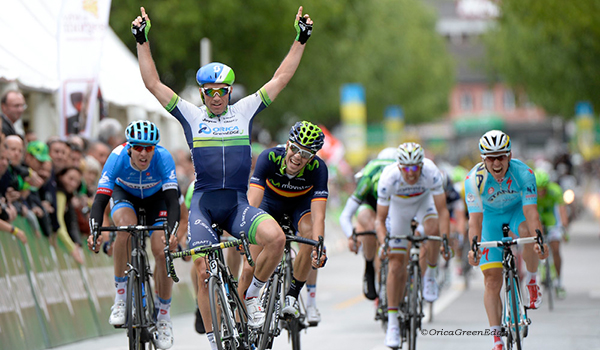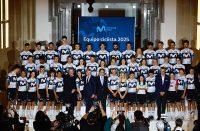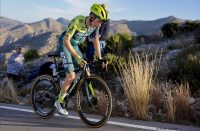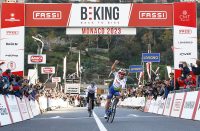ORICA-GreenEDGE’s Michael Albasini sprinted to victory on the first road stage of the Tour de Romandie, ending a ten year drought for Swiss riders in their home country tour. Popping out from a reduced bunch with the finish line in sight, Albasini easily overtook Thomas Voeckler (Europcar), who was ahead of the bunch after a late race attack, en route to the win in Sion. It is the 13th victory for ORICA-GreenEDGE in 2014; the first for Albasini.
“I’m always really motivated for the Swiss races,” said Albasini. “Of course I want to show something when I’m racing at home. I’m really happy with the race today. It was a good win. It was important that I get some results out of the good shape I have now. It’s been ten years since the last Swiss rider won here, so I know the people here are also really happy about my win.”

Albasini win at Romandie
“A few weeks ago, we had people wondering when we might get some results in Europe,” said Sport Director Neil Stephens. “In the past few weeks, we’ve won in Pais Vasco. We won Liège-Bastogne-Liège, and now we’ve won here. We’re ticking the boxes we should be ticking and adding a few bonus results as well.”
Snow forced race organisers to shorten the opening road stage. The length of the stage was more than halved as the start was moved from Ascona to Brigerbad with the climb over Simplon Pass removed from the route. The category two climb that included the early slopes of the road leading up the Crans Montana ski station would prove the more decisive place on the 88 kilometre stage.
“The changes were a bit of a hassle really,” said Stephens. “In staying that, we know it was a hassle for everyone in the whole peloton. We went to sleep last night with many unanswered questions. We didn’t know if the stage was on, what time it would start or how we would get to the start.”
“As it was, we got up earlier than necessary and our meal times were out of whack,” Stephens added. “We drove a long period in the car to the new stage start, and we arrived three hours before the stage. It was the same for the whole peloton. We were all aversely affected in the same way.”
“I was worried the route change would work against us,” Stephens admitted. “We knew it was a hard punchy sort of finish, but I was hoping we would do the big mountain pass or at least ride around the mountain. I thought Michael needed a more select group or a harder race to win today. As it turned out, the speed was quite high and a small group came to the line anyway. My worries at the start about the shortened stage proved unjustified.”
Despite the logistical challenges the changes to the stage presented, Albasini was happy to avoid the snowy mountain pass. While the shortened stage could have meant a bigger bunch at the finish, he remained confident in his ability to secure a result in Sion.
“If the stage had been longer, we would have ridden through the snow and rain,” said Albasini. “I was quite happy that we didn’t have to do that. I think it was a good decision to change the stage. It would have been really cold and also dangerous. It all worked out well for me, so I’m not going to complain.”
Two Swiss riders, Reto Hollenstein (IAM) and Silvan Dillier (BMC), were joined by Boris Vallee (Lotto-Belisol) in the early break. A cagey peloton never allowed the trio a long leash, bringing them back ahead of the stage’s only categorised climb. With the peloton intact, several riders attacked from the bunch in pursuit of the mountain points on offer but were brought back to the bunch over the summit.
“I actually felt really good all day,” said Albasini. “I never found myself in any difficulties. On the last climb, I was really comfortable and not over the limit.”
Vincenzo Nibali (Astana) used the descent to slip away from the peloton. Well known for his downhill abilities, Nibali established a half-minute advantage over the peloton. It was Nibali’s bid for solo glory blew the race apart.
“When I saw there were not many guys left, I worked my way through the bunch,” explained Albasini. “I became quite confident at that point that I could get a good result out of the stage. It’s not exactly a lottery but when it’s not super controlled, a lot can happen. I knew I needed to react and be at the front. I managed that quite well, I think.”
“I was worried when Nibali attacked and went alone on the downhill,” added Albasini. “It was obvious that they wouldn’t let him go. There were too many guys riding the general classification that were interested in bringing him back. I was quite sure that he wasn’t going to ride to the finish alone.”
Cameron Meyer provided crucial support to Albasini in the finale. When the peloton overtook Nibali at the five kilometre mark, Meyer guided Albasini into position. It was a mutually beneficial effort as Meyer looked to protect his overall ambitions.
“In addition to riding for Michael Albasini today, we also were looking after Cameron,” said Stephens. “As we were coming into the finish I told Cam: ‘Look, if you can be there and give Michael a bit of a hand, do that. Don’t make too much of an effort, but it would be great if we could achieve two things at once today.’ That’s exactly what happened.”
With bonus seconds for the win, Albasini jumps up to second overall behind prologue winner Michal Kwiatkowski (Omega Pharma – Quick-Step). Five seconds outside the race lead, Albasini is tied on time with Ramunas Navardauskas (Garmin-Sharp) in third. Sixteenth overall overnight, Meyer sits in 12th place following stage one.
“It was a very good day for the team,” said Stephens. “As always, there’s only room on the podium for one winner, but it’s the collective work from all the riders that gets the one guy up there. Congratulations are in order for the other boys as well.”




